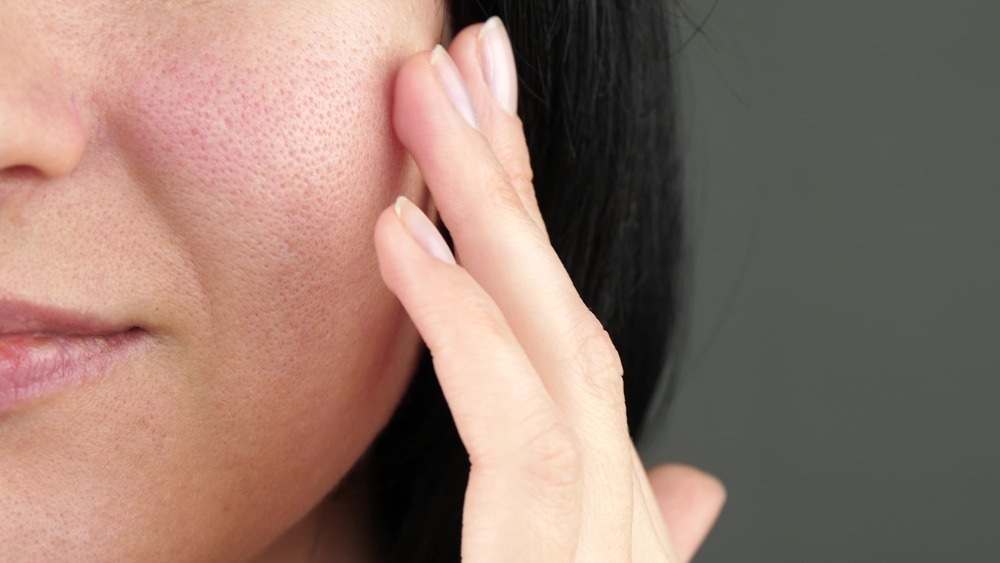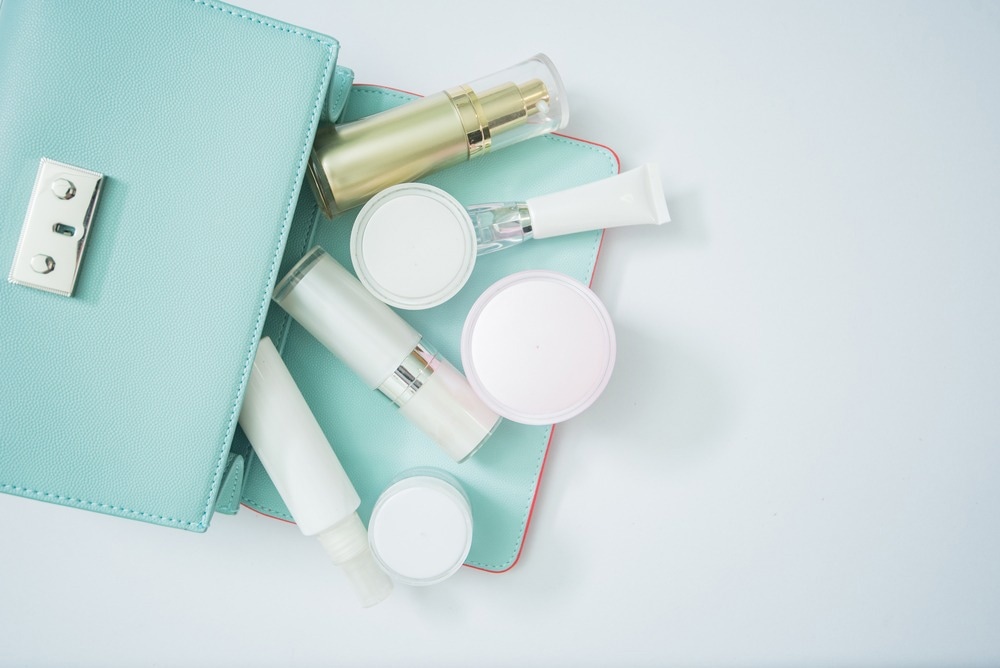Air pollution and its effect on skin health
Emergence of anti-pollution skincare products
Development of anti-pollution skincare products
Common ingredients in anti-pollution skincare products
Emerging trends in anti-pollution skincare
References
Further reading
Air pollution is defined as indoor and outdoor environmental contamination caused by chemical, physical, or biological agents that can modify the natural characteristics of the atmosphere. Carbon monoxide, methane, ozone, smoke, soot, pollen, mold, and heavy metals are common examples of air pollutants.

Part of a woman's face close-up. Image Credit: Julia Diak/Shutterstock.com
Air pollution and its effect on skin health
Particulate matter (PM) and polycyclic aromatic hydrocarbons are the most detrimental pollutants that are generated via the burning of industrial and vehicle fossil fuels. Other pollutants, such as cigarette smoke, ultraviolet light, tropospheric ozone, and volatile organic compounds, can be generated from a wide variety of sources.
Frequent exposure to high levels of air pollutants can lead to premature aging, photodamage, patchy skin, solar lentigo, atopic dermatitis, psoriasis, and even skin cancers. Existing evidence indicates that PM coated with polycyclic aromatic hydrocarbons and volatile organic compounds can easily cross the cutaneous lipid barrier because of their lipophilic properties.
Upon entering the skin, air pollutants trigger the production of reactive oxygen species (ROS), which subsequently causes oxidative damage by depleting the enzymatic and non-enzymatic antioxidant capacities of the skin. The interaction of ROS with lipid components of the plasma membrane can further cause skin tissue injury by triggering lipid peroxidation.
Excessive ROS production by pollutants can increase the production of pro-inflammatory mediators, which can act in combination with oxidative stress mediators to induce DNA damage, activation of various transcription factors associated with cell proliferation and differentiation, and degradation of dermal connective tissues.
Aryl hydrocarbon receptor is a ligand-activated transcription factor that regulates the expression of genes encoding vital enzymes associated with xenobiotic (synthetic chemicals) metabolism. Pollutants generated from various sources can bind to and activate aryl hydrocarbon receptors, leading to the modulation of vital physiological processes. Recent evidence indicates that polycyclic aromatic hydrocarbon-containing PM acts as a potential agonist of activate aryl hydrocarbon receptors.
Emergence of anti-pollution skincare products
Anti-pollution skincare products have gained immense attention in the personal care and cosmetic industry in the past couple of years because of a persistent worsening of air quality worldwide. With its initial emergence in the Asia Pacific region, the anti-pollution movement is currently entering Western markets because of a gradual increase in air pollution over time in Western countries.

Cosmetic products. Image Credit: SunyawitPhoto/Shutterstock.com
An ever-increasing urbanization and industrial development are among the major causes of air quality worsening. About 54% of the global population is currently living in urban areas. It has been predicted that about 6.4 billion people will be urbanized by 2050. With increasing understanding about the detrimental impact of air pollution on skin health, people are becoming more interested in using anti-pollution skincare products.
Recent survey reports indicate that about 19% of US consumers, 36% European, and 37% Asian consumers consider air pollution as a major cause of skin damage. Recent market analysis reports predict that the anti-pollution skincare product market value will increase from 7,511 million USD in 2023 to 15,247 million USD in 2033.
Development of anti-pollution skincare products
It is a challenging task to develop globally harmonized anti-pollution skincare products because of the variation in the levels and types of pollutants, as well as the differences in skin types according to ethnicity. It is also difficult to develop a single product that can effectively deliver multiple anti-pollution benefits.
Most of the skincare products that are available in the market protect against air pollution by reducing pollutant deposition on the skin, preventing the penetration of pollutants through the skin, restoring and strengthening skin protective barrier, improving skin hydration, replenishing antioxidant reserves, reducing inflammation; controlling melanogenesis; promoting collagen synthesis; or protecting skin from harmful ultraviolet (UV) radiation.
Common ingredients in anti-pollution skincare products
Plant-derived bioactive compounds, including monomers, phenolic compounds, phytosterols, and saponins, are major ingredients of many skincare formulations. These compounds are known to have a significant ability to reduce oxidative stress and inflammation caused by air pollutants.
Nicotinamide is a biologically active form of vitamin B3, which is widely found in mushrooms, nuts, and certain types of fish. Many skincare products use this compound because of its ability to reduce skin wrinkles and pigmentation and improve skin elasticity. In vitro studies have shown that the compound can protect skin cells from DNA damage, apoptosis, and autophagy by reducing PM-induced ROS production.
Retinoids are derivatives of vitamin A that are widely used in many skincare products, especially in anti-aging and anti-pollution products. Studies have shown that retinol-containing products can potentially improve skin appearance, reduce skin hyperpigmentation, and increase skin brightness and elasticity.
Carotenoids are fat-soluble pigments widely found in red and orange fruits and vegetables and in certain types of algae and bacteria. Carotenoids, including lutein, zeaxanthin, beta-carotene, lycopene, and astaxanthin, are valuable ingredients in many skincare products because of their robust antioxidant activities that help prevent pollutant-induced premature aging.
Plant phenolic compounds, such as phenolic acids, flavonoids, ellagitannins, and phlorotannins, are the most appealing skincare ingredients because of their ROS-scavenging and anti-inflammatory properties. Green tea polyphenols, including epicatechin, Epicatechin-3-O-Gallate, Epigallocatechin, and Epigallocatechin-3-O-Gallate, have shown skin protective efficacy against premature aging, photo-aging, and melanoma.
Resveratrol, a natural polyphenolic compound isolated from dark pigmented fruits, has shown anti-pollution activity against PM exposure. The compound prevents pro-inflammatory cytokine production by inhibiting aryl-hydrocarbon receptors expressed on immune cells.
Phlorotannins, such as diphlorethohydroxycarmalol, dieckol, and eckol, are polyphenolic compounds mostly derived from brown marine algae. Recent evidence indicates that these compounds can protect PM-exposed human skin cells by reducing pro-inflammatory cytokine production and lipid peroxidation.
Emerging trends in anti-pollution skincare
Many bioactive ingredients with anti-pollution properties are emerging in the skincare market, such as plant oils, plant extracts with high glycoside content, microbial-based preparations, probiotics, prebiotics, and plant-based ferment extracts.
Many devices are also emerging in the skincare market, such as cleansing brushes and product-delivery devices. Cleansing brushes use gentle sonic action to remove pollutants and deeply clean the skin. Product-delivery devices use the Intense Pulsed Light technique to deliver skincare products at the target sites effectively.
References
Further Reading
Last Updated: Feb 7, 2024